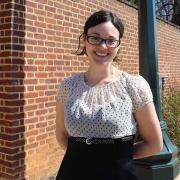Please note: the Mellon Indigenous Arts program ended in 2021. This web site is now for reference only. |
The Mellon Indigenous Arts Initiative is pleased to announce six Mellon Arts Fellows for 2018-19. Each faculty fellow will research and develop a new course curriculum related to Indigenous arts.
Allison Bigelow, Assistant Professor of Spanish, Department of Spanish, Italian, & Portuguese

“Are’ u xe’ ojer tzij / Waral K’iche’ u b’i’” (This its root ancient word / Here Quiche’ its name), or “Are’ uxe’ ojer tzij waral K’iche’ ub’i’” (This is the origin of the ancient word of this place named K’iche’). Or, “Este es el principio de las antiguas historias de este lugar llamado Quiché” (This is the beginning of the ancestral stories of this place called K’iche’), or, “Entonces no había ni gente, ni animales, ni árboles, ni piedras, ni nada” (And so there were neither people, nor animals, nor tres, nor stones, nor any thing). These are the opening lines of the Popol Wuj, the Maya K’iche’ book of creation, as translated by Allen J. Christenson, Sam Colop, Adrián Recinos, and Ermilo Abreu Gómez. From its appearance on Pre-Columbian vases and iPhones, the Popol Wuj has been printed in approximately 1,200 editions that span 25 world languages. No single edition can convey the text’s visual, narrative, or cultural complexity, or show how the story has been shaped over time by artists, activists, editors, intellectuals, priests, and politicians. For these reasons, I am collaborating with students and faculty in the US and Guatemala on a thematic research collection about the Popol Wuj. Our project began in Spring 2017, in a seminar on Latin American Digital Humanities (SPAN 7559/4993) and it is under development at http://multepal.spanitalport.virginia.edu/. During this fellowship, I will focus on adding content from The Fralin Museum collection of pre-Columbian Mayan artwork to our site and developing an undergraduate DH course focused on indigenous and Mesoamerican studies.
Phoebe Crisman, Associate Professor of Architecture, School of Architecture

Phoebe Crisman AIA is Associate Professor of Architecture at the University of Virginia, where she directs the pan-university Global Environments + Sustainability program. She teaches design studios and courses on architecture, urbanism, and sustainability theory. In her writing, situated research, and practice with Crisman+Petrus Architects, she designs strategies to create more resilient and just communities through environmental restoration, socio-economic revitalization, and sustainable design.
The Mellon Fellowship will support the collaborative design of a culturally inspired and sustainable Arts Center with the Sisseton-Wahpeton Oyate (SWO) on their Lake Traverse Reservation in South Dakota. This innovative, cross-disciplinary arts research project is in partnership with Nis’to, a native non-profit organization of SWO citizens, the Sisseton Wahpeton Tribal College, and an interdisciplinary group of UVA faculty and students. The studio seminar will combine both scholarly and creative methodologies to explore and design arts programs, architecture, and landscapes to support traditional and contemporary Dakotah artistic production, including visual arts, dance, music, theater, and culinary arts. The research will explore how Native culture and meanings may be embodied in the spaces, forms, and materials of the built environment. UVA students in Architecture, Art History and Curatorial Practices, Studio Art, Global Environments + Sustainability, Environmental Science, Global Development Studies and other fields of inquiry will gain firsthand experience with situated research. This effort will support the tribe’s larger projects of undoing colonial legacies, supporting cultural recovery, and advancing economic and political sovereignty. The SWO Arts Center project will bring an Arts focus to the multi-faceted and growing UVA research collaboration with this indigenous Dakotah community. In turn, the project will directly contribute to the goal of establishing UVA as “a research center of excellence for the study of the Indigenous Arts of Australia and the Americas.”
Federico Cuatlacuatl, Assistant Professor of Digital Art, McIntire Department of Art

Born in Cholula, Puebla as a Mexican indigenous artist, Federico then immigrated to Indiana and received his MFA specializing in Digital Arts at the Bowling Green State University. As a transdisciplinary artist, Federico Cuatlacuatl’s work is invested in disseminating topics of Latinx immigration, social art practice, and cultural sustainability. Building from his own experience growing up as an undocumented immigrant and currently holding DACA, Federico’s research is primarily concerned with current social, political, and cultural issues that Latinx undocumented immigrants face in the U.S. Federico’s independent productions continually screen in national and international film festivals. As founder and director of the Rasquache Artist Residency in Puebla, Mexico, he actively stays involved in socially engaged works and binational endeavors.
Cuatlacuatl’s Mellon Fellowship project “Digital Repatriations of Mesoamerica” focuses on the Fralin Museum’s pre-Columbian collection with special interest in seals, figurines, iconography, and codex of various regions in Mexico. Digital artistic production and reproduction methods will be utilized to bring forth relevancy of the pre-Columbian collection in relation to current Mexican immigrant realities and urgencies. Amplifying the complex history and politics of these Mesoamerican objects contextualizes our profound understanding of current transculturation processes in Mexican undocumented immigrant communities throughout the U.S. Through the lens of Colonialidad in understanding Mesoamerican history of otherness, sociopolitical tensions, hierarchies & power systems; digital repatriations and narratives will disseminate current immigrant pressing realities as it relates to the pre-Columbian collection.
James Igoe, Associate Professor of Anthropology, Department of Anthropology

Jim Igoe is an associate professor of Anthropology. His research addresses conflicts between national parks and indigenous communities in East Africa and North America, and the role of mass-produced images in mediating people’s relationships with the environment. He author of Conservation and Globalization: A Study of National Parks and Indigenous Communities from East Africa to South Dakota (2004) and The Nature of Spectacle: On Images, Money, and Conserving Capitalism (2017). He also appears in the film A Place without People (2009), a critical history of Serengeti National Park.
My project focus on indigenous landscapes, as spaces of cultural production, land rights advocacy, and environmental care. The Kluge-Ruhe Aboriginal Art Collection has significant connections to indigenous landscapes in these terms. Each painting is an expression of an ancestral event, of a particular place and time. Aboriginal art has moreover played a key role in historical land and sea rights claims, while proceeds from successful exhibitions have funded important community initiatives. I plan to trace connections between paintings in the collection to related communities and landscapes in Australia. I will also be drawing comparisons to indigenous landscapes with which I am already familiar: The Maasai Steppe in northern Tanzania and the Black Hills in South Dakota.
Noel Lobley, Assistant Professor of Music, McIntire Department of Music

In South Africa, questions of indigeneity and authority are fraught with histories of violent displacement, racial hierarchies, and cultural erasure. Since 2008, I have been working with artists, dancers, community leaders, sound archivists, and scholars based in Grahamstown, South Africa. Grahamstown is the site of the International Library of African Music (ILAM), the world’s largest collection of ethnographic sound recordings from the continent. My practice-driven work has focused on reactivating archival sound recordings through local social mechanisms, in close collaboration with indigenous Xhosa artists and community members from the Eastern Cape province.
As a Mellon Indigenous Arts Fellow, I will develop my research and creative work on collaborative and ethical sound curation in local and global contexts. This work aims to de-centre colonial archives and explores innovative methods and practices to represent indigenous knowledge, stories, and art forms. I will also develop the curriculum for ‘Curating Sound’, a new undergraduate interactive arts course. This experimental and discovery-driven course will explore the intersections of curatorial practice, sound studies, ethnography, composition, sound art, and community arts practice. We will build a series of practical engagements and interactions linking archival collections, local and international artists and art and community spaces, and the method and philosophies of embodied deep listening. We ask whether it is desirable or even possible to curate the elusive, invasive and ephemeral object, medium and experience of sound.
Karenne Wood, Director of Virginia Indian Programs, Virginia Foundation for the Humanities

Karenne Wood is an enrolled member of the Monacan Indian Nation who directs Virginia Indian Programs at the Virginia Foundation for the Humanities. She holds a MFA in poetry and a PhD in linguistic anthropology. She has worked at the National Museum of the American Indian as a researcher and at the Association on American Indian Affairs as a repatriation specialist. In 2015 she was honored as one of Virginia’s Women in History. Karenne is the author of two poetry collections, Markings on Earth (2000) and Weaving the Boundary, (2016). Her poems have appeared in such journals as The Kenyon Review, Orion, and Shenandoah.
As a Mellon Arts Fellow, Wood will develop a course focused on Native American literature in context, using readings in history and crossing disciplines to give students a multidimensional orientation to the works we study through art, music, dance, environmental science, and spirituality.